Last Updated on Apr 28, 2025 by vanessa sequeira
Every investor’s journey is different—while some are driven by the excitement of chasing higher returns through equities, others look for a balance between growth, stability, and lower risk. Debt mutual fund schemes offer a low-risk approach to achieving your financial goals. With a variety of debt fund types available in India, such as low-risk debt funds and high-return debt funds, it’s essential to understand the different debt fund options and how to select the best debt mutual funds India. This guide will explore the advantages, risks, and factors to consider before investing in debt mutual fund investments, helping you make informed decisions about your debt fund portfolio.
Table of Contents
Best Debt Mutual Funds In 2025 – Based On 5-Yr CAGR
| Name | Sub Category | AUM (Cr) | CAGR 3Y (%) | Expense Ratio (%) | CAGR 5Y (%) |
| Bank of India Credit Risk Fund | Credit Risk Fund | 110.06 | 5.81 | 0.98 | 27.39 |
| Aditya Birla SL Medium Term Plan | Medium Duration Fund | 2,206.08 | 15.12 | 0.86 | 14.28 |
| DSP Credit Risk Fund | Credit Risk Fund | 207.05 | 14.90 | 0.4 | 11.69 |
| Bank of India Short Term Income Fund | Short Duration Fund | 114.11 | 9.94 | 0.45 | 10.91 |
| Aditya Birla SL Credit Risk Fund | Credit Risk Fund | 963.57 | 11.64 | 0.67 | 10.61 |
| Baroda BNP Paribas Credit Risk Fund | Credit Risk Fund | 173.49 | 8.23 | 0.79 | 10.02 |
| JM Low Duration Fund | Low Duration Fund | 223.94 | 7.02 | 0.35 | 9.91 |
| UTI Dynamic Bond Fund | Dynamic Bond Fund | 447.05 | 10.75 | 0.71 | 9.82 |
| UTI Medium to Long Duration Fund | Medium to Long Duration Fund | 311.56 | 10.66 | 1.17 | 9.39 |
| Nippon India Credit Risk Fund | Credit Risk Fund | 1,001.05 | 8.34 | 0.7 | 9.21 |
Note: The list of debt mutual funds is derived from Tickertape Mutual Fund Screener and is as of 25th April 2025. The parameters used to curate the list are as follows:
- Category: Debt
- Plan: Growth
- CAGR 5Y: Sort from highest to lowest
Top Debt Mutual Funds – Based On Low Expense Ratio
| Name | Sub Category | AUM (Cr) | CAGR 3Y (%) | Expense Ratio (%) |
| Aditya Birla SL Inv Inc-QS I | Debt – Interval Fund | 28.75 | 7.26 | 0.02 |
| Franklin India ST Income Plan | Short Duration Fund | 12.51 | 5.38 | 0.04 |
| Axis Overnight Fund | Overnight Fund | 6,348.03 | 6.39 | 0.05 |
| Bandhan Overnight Fund | Overnight Fund | 666.73 | 6.35 | 0.05 |
| Aditya Birla SL Overnight Fund | Overnight Fund | 5,253.21 | 6.36 | 0.05 |
| Nippon India Inv-Annual-I | Debt – Interval Fund | 2.98 | 6.76 | 0.05 |
| NJ Overnight Fund | Overnight Fund | 178.49 | 0.00 | 0.05 |
| Invesco India Overnight Fund | Overnight Fund | 353.22 | 6.35 | 0.06 |
| HSBC Overnight Fund | Overnight Fund | 2,086.45 | 6.37 | 0.06 |
| Tata Overnight Fund | Overnight Fund | 1,774.00 | 6.37 | 0.06 |
Note: The list of debt mutual funds is derived from Tickertape Mutual Fund Screener and is as of 25th April 2025. The parameters used to curate the list are as follows:
- Category: Debt
- Plan: Growth
- Expense Ratio: Sort from lowest to highest
Less Volatile Debt Funds In India
| Name | Sub Category | AUM (Cr) | CAGR 3Y (%) | Expense Ratio (%) | Volatility (%) |
| Bank of India Overnight Fund | Overnight Fund | 41.29 | 6.44 | 0.08 | 0.01 |
| Mirae Asset Overnight Fund | Overnight Fund | 390.72 | 6.38 | 0.07 | 0.01 |
| Edelweiss Overnight Fund | Overnight Fund | 566.22 | 6.30 | 0.11 | 0.01 |
| Canara Rob Overnight Fund | Overnight Fund | 348.54 | 6.27 | 0.1 | 0.01 |
| Franklin India Overnight Fund | Overnight Fund | 420.82 | 6.30 | 0.07 | 0.01 |
| Sundaram Overnight Fund | Overnight Fund | 472.92 | 6.35 | 0.07 | 0.01 |
| Bandhan Overnight Fund | Overnight Fund | 666.73 | 6.35 | 0.05 | 0.01 |
| Aditya Birla SL Overnight Fund | Overnight Fund | 5,253.21 | 6.36 | 0.05 | 0.01 |
| ICICI Pru Overnight Fund | Overnight Fund | 7,680.70 | 6.34 | 0.1 | 0.01 |
| Invesco India Overnight Fund | Overnight Fund | 353.22 | 6.35 | 0.06 | 0.01 |
Note: The list of debt mutual funds is derived from Tickertape Mutual Fund Screener and is as of 25th April 2025. The parameters used to curate the list are as follows:
- Category: Debt
- Plan: Growth
- Volatility: Set to Low – Sort from lowest to highest.
The term debt doesn’t need an introduction; it means loan. Debt mutual funds are a scheme which pools money from investors. This money is used to purchase debentures or bonds issued by public, private or government entities. Hence, when you invest in debt mutual funds, you indirectly give these entities loans. As it majorly deals with debt instruments that earn a fixed interest rate, the risk is lower than equity mutual funds.
What are Debt Mutual Funds?
Debt mutual funds are a type of mutual fund that invests primarily in fixed-income securities such as bonds, treasury bills, and other debt instruments. These funds provide investors with regular income and are considered less volatile than equity funds. Debt investment funds are managed by professional fund managers who invest in various debt instruments based on their maturity, risk, and return profiles. Debt funds India are designed to suit the financial goals of investors seeking steady returns with relatively lower risk exposure compared to equities.
Who Should Explore Debt Mutual Funds?
Debt mutual funds are suitable for conservative investors who prioritise capital preservation and steady income over high returns. These funds are ideal for those with a low-risk tolerance or for investors looking for an option to balance out a portfolio heavily weighted in equities. They can also be a good choice for those planning for short-term financial goals, such as purchasing a car or funding education, as well as retirees seeking a regular income stream. Furthermore, those looking to diversify their investment portfolio can benefit from debt fund options as they offer stability.
Advantages of Investing in Debt Mutual Funds
- Lower Risk: Debt funds are considered low-risk investments compared to equities because they primarily invest in fixed-income securities.
- Steady Income: Many debt mutual fund schemes pay regular interest, which can act as a consistent source of income.
- Diversification: Investing in debt funds helps diversify a portfolio by adding exposure to low-risk fixed-income instruments.
- Liquidity: Unlike direct bonds, debt funds offer better liquidity as they can be easily bought or sold in the market.
- Tax Efficiency: Long-term debt funds India benefit from favourable tax treatment, with capital gains being taxed at a lower rate if held for more than three years.
Risks Associated with Investing in Debt Mutual Funds
- Interest Rate Risk: When interest rates rise, the prices of existing bonds typically fall, which can negatively impact the returns of debt funds, especially long-term debt funds.
- Credit Risk: There is a risk that the issuer of the bond may default on its interest or principal payments, especially in the case of lower-rated debt instruments.
- Inflation Risk: The returns from debt funds may not always outpace inflation, leading to a potential erosion of purchasing power over time.
- Liquidity Risk: While debt mutual funds offer better liquidity than direct bonds, some funds may still have restrictions on withdrawals, especially in the case of specific debt fund types like closed-ended schemes.
Factors to Consider Before Investing in Debt Mutual Funds
- Investment Horizon: Short-term debt funds are ideal for goals within one to three years, while long-term debt funds may suit investors with a more extended investment horizon.
- Risk Appetite: Investors with a low-risk tolerance should consider conservative debt funds or low-risk debt investment funds, while those seeking higher returns might explore high-return debt funds with slightly higher risk.
- Fund Performance: Reviewing debt fund returns over various periods is essential to gauge the historical performance of the debt mutual fund schemes you’re considering.
- Expense Ratio: Like other mutual funds, debt funds also charge a management fee, known as the expense ratio. Explore funds with a low expense ratio to maximise returns.
- Fund Manager Expertise: A skilled fund manager can make a significant difference in the performance of debt mutual fund investments. Ensure the fund manager has a strong track record in managing debt portfolios.
- Debt Fund Types: Understanding the various debt fund types, such as corporate bond funds, gilt funds, and government bond funds, can help align your investment choice with your risk and return expectations.
How to Identify the Best Debt Mutual Funds
Identifying the best debt mutual funds requires evaluating key factors that align with your financial goals and risk tolerance. Here’s how to choose wisely:
- Investment Goals & Horizon: For short-term goals, opt for liquid or short-term debt funds. Long-term investors can consider funds with higher yields.
- Risk Tolerance: Choose funds based on your risk appetite. Conservative investors should focus on low-risk debt funds, while those willing to take on more risk can consider high-return debt funds.
- Fund Performance: Check debt fund selection criteria, which include metrics related to historical returns and fundamentals, especially during periods of rising interest rates. Consistent performance over time is a good indicator of a fund’s reliability.
- Expense Ratio: Lower expense ratios help maximise returns. Compare similar funds and choose those with the best value.
- Debt Fund SIP: Consider debt fund SIP options for regular investing. SIPs can help mitigate market timing risks and allow for rupee cost averaging.
- Debt Mutual Fund Strategies: Ensure the fund’s strategy aligns with your objectives. Funds focusing on long-term bonds may offer higher returns, but with increased risk.
Taxation on debt mutual funds
The debt mutual funds taxation is as follows:
- STCG: If you sell your debt fund before 3 yr from the investment date, then Short-Term Capital Gain (STCG) tax is applicable. The gains will be added to your income and taxed as per your income tax slab.
- LTCG: Before 1st April 2023, if you sell your debt fund 3 yr from the purchase date, as per the long-term capital gains tax (LTCG), it is taxed at 20% with indexation benefits and 10% without indexation benefits.
However, starting from 1st April 2023, there are new rules for how gains from debt funds are taxed. The special benefit called “indexation” for long-term gains won’t apply anymore. Instead, any profits will be added to the investor’s taxable income and taxed based on their regular tax rate.
For funds bought after April 1, 2023, it doesn’t matter how long you hold them – any gains will be treated as short-term. But if you have funds bought before 1st April 2023 and sell them after that date, you can still use the indexation benefit for long-term gains.
Indexation benefit is a benefit applied to your investment amount to tax your returns fairly, which factors in inflation. For example, if your fund generates a 10% return over 3-yr and the inflation in that period is 6%, you pay 20% tax on the difference between the return and inflation, i.e., 10-6 = 4%. Now the total tax is 4*20% = 0.8%, where you’ll be taxed for 10-0.8= 9.2% instead of 10% returns.
Equity funds vs debt funds
Equity and debt funds are two popular types of mutual funds. The difference between these funds is where the money is invested. Equity funds invest primarily in equity shares and related securities. While debt funds invest in debt securities.
Conclusion
Apart from debt funds, there are several other mutual fund types available in the market. Irrespective of the fund type, you need to understand your investment objective and risk appetite. Find the scheme that aligns with your objectives.
Use Tickertape Mutual Fund Screener to filter the best mutual funds in India based on 50+ filters. Not just that, using Tickertape’s Mutual Fund Portfolio, you can also keep an eye on the performance of the funds.
FAQs
- What is a debt mutual fund?
As the name suggests, debt funds are one of the mutual fund schemes. These funds invest in fixed-income instruments like government and corporate bonds, money market instruments, corporate debt securities, etc. Debt funds are also known as Bond Funds or Fixed Income Funds.
- What are the debt mutual funds returns?
The returns on the debt funds depend on the fund you choose. Similar to equity funds, the returns keep fluctuating on the debt mutual funds.
- What are the types of debt mutual funds?
There are various types of debt mutual funds, which are as follows:
- Floating Rate Fund
- Banking and PSU Fund
- Ultra Short Duration Fund
- Medium Duration Fund
- Fixed Maturity Plans
- Money Market Fund
- Overnight Fund
- Credit Risk Fund
- Dynamic Bond Fund
- Liquid Fund
- Corporate Bond Fund
- Low Duration Fund
- Gilt – Long Term Fund
- Short Duration Fund
- Sectoral Fund – Infrastructure (Debt)
- Long Duration Fund
- Gilt – Short and Mid Term Fund
- Medium to Long Duration Fund
- Debt – Interval Fund
- How will the new debt fund tax rules impact investors?
The removal of the indexation benefit on long-term gains from debt funds means investors, especially those in the 20% and 30% tax brackets, will pay more in taxes. Also, choosing between debt schemes and bank deposits might be tricky with the new tax rules.
- What is a short-term capital gain tax on debt mutual funds?
The short-term capital gain on debt mutual fund is added to your (investor) income and taxed as per your income tax slab.
- Best Blue Chip Mutual Funds – List of Top Large-Cap Funds - Jun 6, 2025
- List of Top Fundamentally Strong Stocks in India for 2025 - Jun 4, 2025
- IDCW vs Growth – Which Is Better? - Jun 4, 2025





